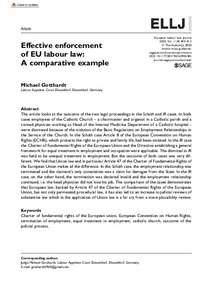Effective enforcement of EU labour law: a comparative example

2020
11
4
December
403-412
EU Charter of Fundamental Rights ; European Convention on Human Rights ; termination of employment ; equal rights ; judicial procedure
Law
https://doi.org/10.1177/2031952520905385
English
"The article looks at the outcome of the two legal proceedings in the Schüth and IR cases. In both cases employees of the Catholic Church – a choirmaster and organist in a Catholic parish and a trained physician working as Head of the Internal Medicine Department of a Catholic hospital - were dismissed because of the violation of the Basic Regulations on Employment Relationships in the Service of the Church. In the Schüth case Article 8 of the European Convention on Human Rights (ECHR), which protects the right to private and family life, had been violated. In the IR case the Charter of Fundamental Rights of the European Union and the Directive establishing a general framework for equal treatment in employment and occupation were applicable. The dismissal in IR was held to be unequal treatment in employment. But the outcome of both cases was very different. We find that Union law and in particular Article 47 of the Charter of Fundamental Rights of the European Union makes all the difference. In the Schüth case, the employment relationship was terminated and the claimant's only consolation was a claim for damages from the State. In the IR case, on the other hand, the termination was declared invalid and the employment relationship continued, i.e. the head physician did not lose his job. The comparison of the cases demonstrates that European law, backed by Article 47 of the Charter of Fundamental Rights of the European Union, has not only permeated procedural law, it has also led to an increase in judicial reviews of substantive law which in the application of Union law is a far cry from a mere plausibility review."
Digital
The ETUI is co-funded by the European Union. Views and opinions expressed are however those of the author(s) only and do not necessarily reflect those of the European Union or the ETUI.